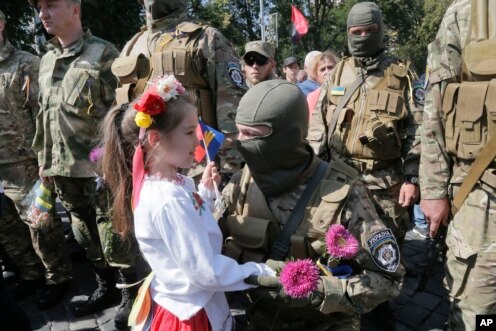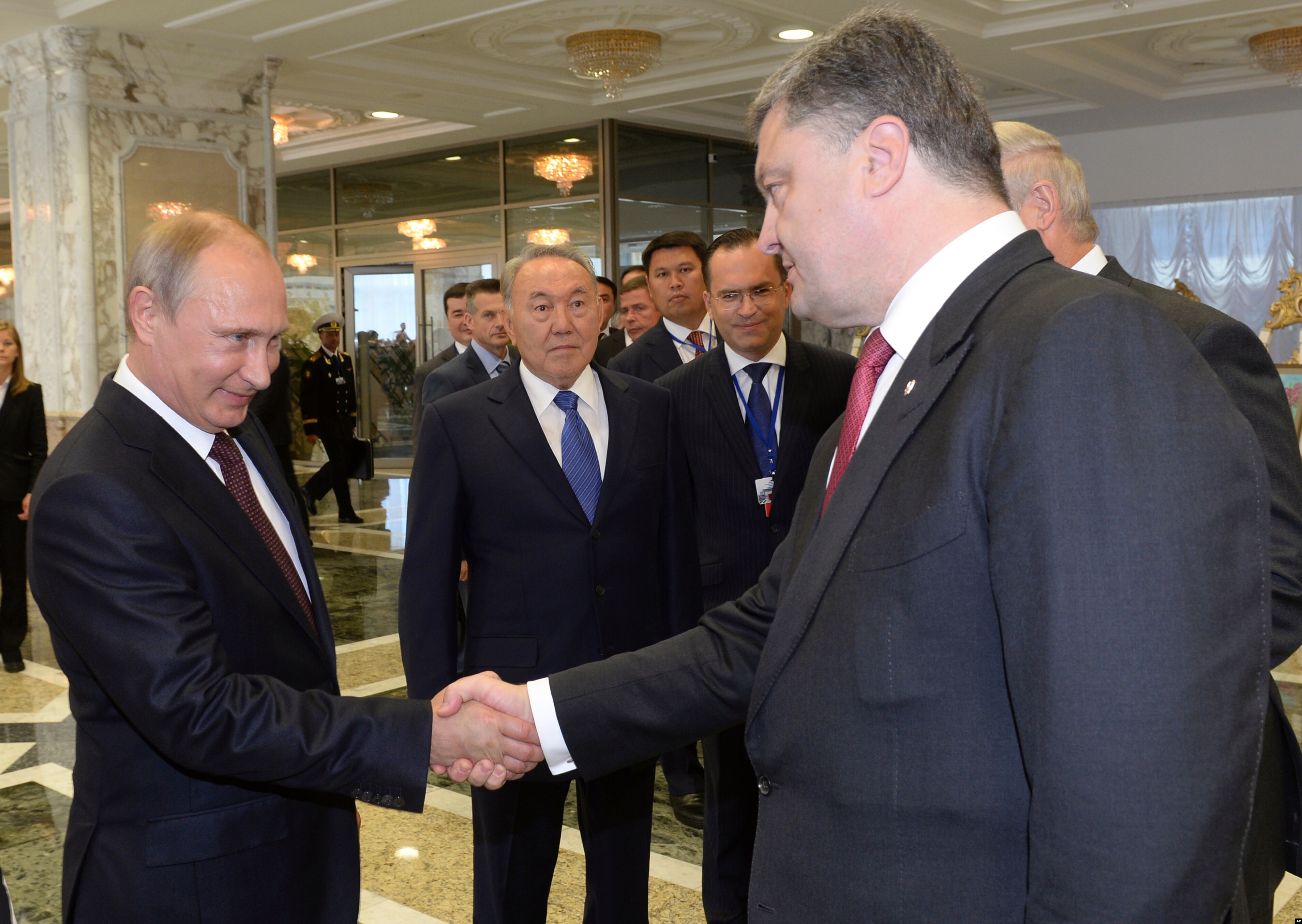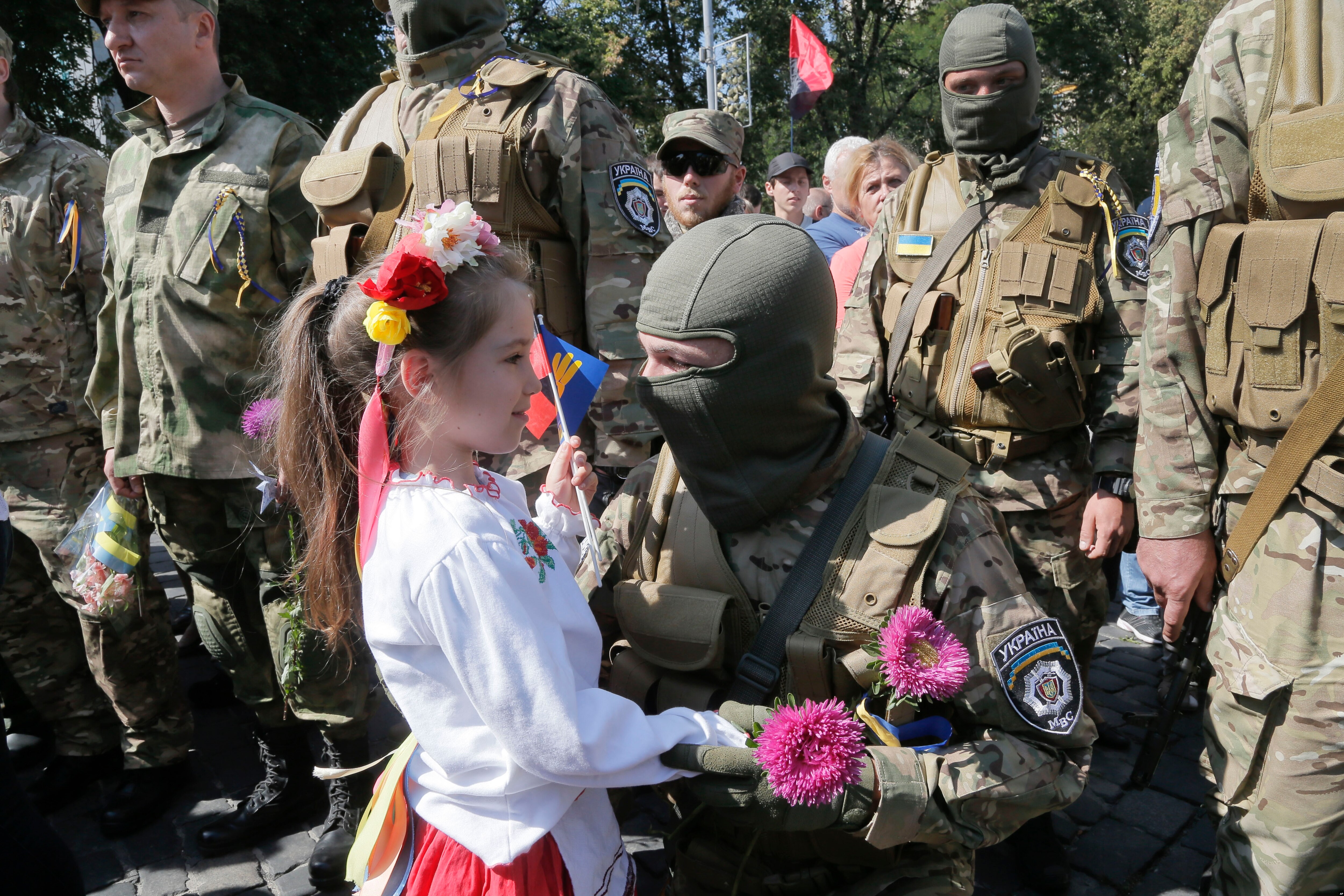Blandly Denying Responsibility
"Many deputies who are in the Rada [parliament] are direct sponsors or accomplices, that is to say allies of the militant separatists."
Ukrainian President Petro Poroshenko
Ukrainian parliament was dissolved as President Poroshenko called for early elections, a move that respects the Ukrainian constitution since the ruling coalition collapsed weeks earlier. Many members of parliament had supported Viktor Yanukovych, the previous president backed by Russia, complicit in Russian control of Ukrainian decision-making with respect to the European Union, Ukraine's economic future and its continued post-Soviet-era allegiance to Russia, as a pseudo-satellite, not a separate country.
Col. Andriy Lysenko, speaking for Ukraine's National Security Council spoke of a column of ten tanks, two armoured vehicles and two trucks crossing the border near Shcherbak. He spoke also of shelling during the night from Russia on the city of Novoazovsk. He described the Russian military vehicles that crossed into southeastern Ukraine bearing the flags of the Donetsk separatist rebels.
The announcement of new elections to take place on October 26 preceded a summit between Mr. Poroshenko and Russian President Vladimir Putin on August 26 in Belarus. In a possible attempt by President Poroshenko to offset what he may feel will be pressure on Ukraine to agree to a negotiated end to the conflict between the two countries, with Moscow determined to prevent the Ukrainian military from securing a decided military victory over the rebels.
The incursion that took place on Monday along with the shelling is seen as a Russian manoeuvre to move into Mariupol, a major port on the Azov Sea, a tributary of the Black Sea. On the main road between Russia and Ukraine's Black Sea peninsula of Crimea, annexed by Russia, Mariupol may represent a step to link Russia with Crimea, to consolidate Russia's gains in territory at Ukraine's expense. The entire enterprise an object lesson in unlawful ransacking by one country of another.
Should Moscow decide to embark on yet another such venture to deprive Ukraine of more of its valued territory, it would have the effect of drawing the Ukrainian military away from the Donetsk region which Ukraine is determined to retake from the separatist pro-Russians, to defend its territory from Russia directly in the south, around Mariupol, even though Col. Lysenko asserts that there are sufficient defenders in Mariupol "to repel any attack of uninvited guests".
 Relatives and friends say good-bye to volunteers before they were sent to the eastern part of Ukraine to join the ranks of a special battalion unit fighting against pro-Russian separatists, in Kyiv, Ukraine, Aug. 26, 2014.
Relatives and friends say good-bye to volunteers before they were sent to the eastern part of Ukraine to join the ranks of a special battalion unit fighting against pro-Russian separatists, in Kyiv, Ukraine, Aug. 26, 2014.
Russia has now announced a second aid convoy will soon roll into rebel-held eastern Ukraine. Its unilateral decision to send over 200 trucks laden with provisions into rebel-held territory came on the heels of Kyiv deciding not to exert its military authority over its own territory when Moscow agreed to a plan laid out by Kyiv, NATO and the International Red Cross to inspect the cargo and distribute it according to plan by the IRC, once cleared by Ukrainian inspection.
But Moscow acted otherwise, sending part of the convoy whose loads evaded inspection, directly into rebel-held territory, not through a crossing controlled by Ukraine. And now a similar scenario appears to be unfolding, with Kyiv denouncing Moscow. The government in Kyiv has good reason to insist the aid convoy represented a Russian plot to deliver supplies to the rebels, to slow down government military advances given Moscow's underhanded tactics.
 Russian President Vladimir Putin, left, shakes hands with Ukrainian
President Petro Poroshenko as Kazakh President Nursultan Nazarbayev
looks on prior to their talks in Minsk, Belarus, Aug. 26, 2014
Russian President Vladimir Putin, left, shakes hands with Ukrainian
President Petro Poroshenko as Kazakh President Nursultan Nazarbayev
looks on prior to their talks in Minsk, Belarus, Aug. 26, 2014A "positive" negotiating discussion took place between Messrs. Poroshenko and Putin in Belarus, according to President Putin: "We didn't substantively discuss [details of truce terms between Kyiv and two rebellious eastern regions] conditions of a ceasefire, of agreements between Kyiv, Donetsk and Luhansk. That's not our business, it's up to Ukraine itself", he said smugly to reporters, implicitly disclaiming that Moscow has ever had anything to do with inciting, arming, and aiding the ethnic Russian Ukrainian rebels.
"We can only contribute to create a situation of trust for a possible, and in my view, extremely necessary, negotiation process." This bald-faced sanctimony from the president of a country that had just months earlier annexed vital Black Sea territory from a neighbour, and which country has continued to foment unrest, violence and secession through its rapaciously hegemonic and internationally illegal activities.
As for President Poroshenko, he must surely have heaved a tremendous sigh of utter frustration in the "very tough and complex" two hours of discussions, leaving him to state: "A roadmap will be prepared in order to achieve as soon as possible a ceasefire regime which absolutely must be bilateral in character."
But not as long as Vladimir Putin has any say in the matter.
Labels: Aggression, Conflict, Hypocrisy, Russia, Secession, Ukraine


<< Home